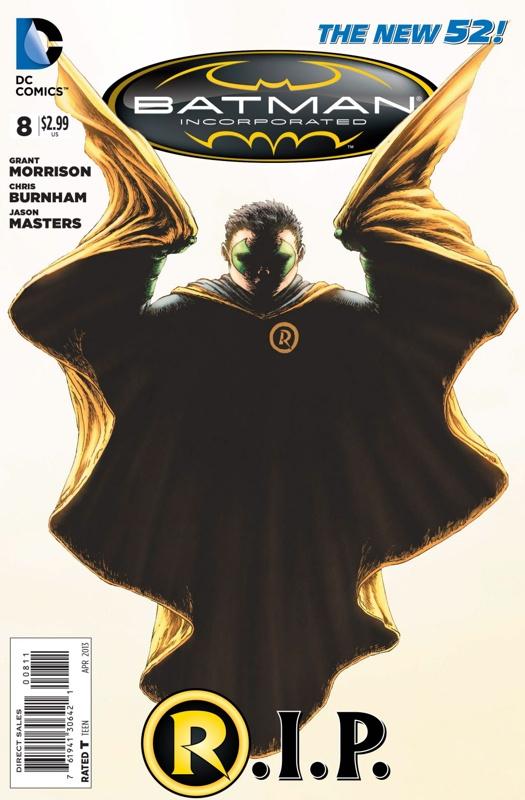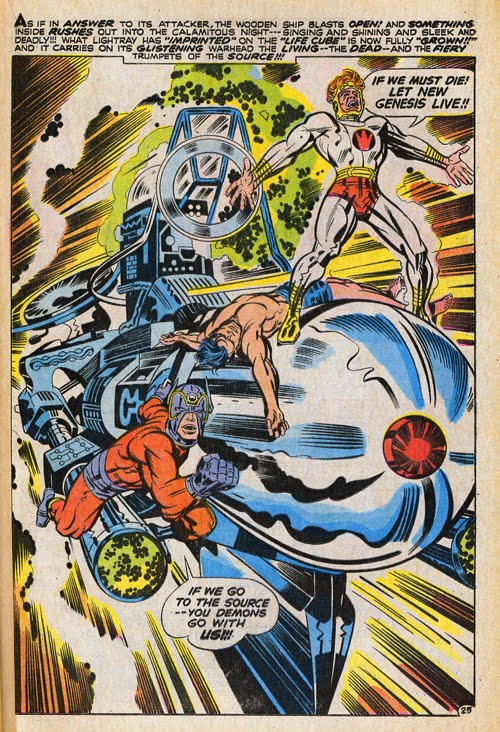Yesterday I talked about Karen Berger's imminent departure from Vertigo, the disappointment I feel as a Vertigo fan, and the excitement I feel wondering what she'll do next.
And you know, that's kind of the perfect metaphor for what it feels like to be a comics fan in general right now. There's just so much bullshit -- but there's so much gold, too.
Since the 1940's, the American comics industry has gone through a regular, 20-year boom-bust cycle. We're in an odd-numbered decade, so if the pattern continues that means we've got another bust coming. And while I think Marvel and especially DC are full-speed-ahead on stupid management decisions to cause the next one, this one's not going to be like the others -- it's going to be smaller, it's going to be confined to those two major publishers, and it's going to happen even as their characters and brands increase in popularity.
Now, both companies seem dead-set on repeating most of the worst excesses of the 1990's -- variant covers, new #1's, big summer crossovers, increasingly muddled continuity reboots, Jim Lee -- and don't seem to get the idea that this is going to go much like it did in the '90's, with a brief boost to sales followed by a crash as everybody gets sick of this crap. DC, in particular, is currently being run by bean counters at Warner who think their best shot at relevance is pushing the Reset button on their universe again and putting out prequels to Watchmen.
Even still, DC's still managing to put out some great books. Dial H is fantastic, Demon Knights is a joy, and Animal Man and Frankenstein were both pretty great until they muddled into an unnecessary crossover. I really don't think it's a coincidence that the best books coming out of DC are the ones that are subject to the least corporate interference and are the least subject to the whims of shared-universe continuity.
And that's just DC proper. Take the the industry as a whole and there's a stunning variety of wild, beautiful, original books -- Saga, Chew, Manhattan Projects, The Massive, to name just a few. There are even some wonderful licensed books -- Adventure Time, Popeye, Godzilla: The Half-Century War. Prophet shows that even a 1990's Liefeld property can turn into a brilliant, offbeat science fiction series worthy of classic Heavy Metal. Dark Horse Presents demonstrates the depth and breadth of modern comics at its greatest, at 80 pages for $8 a month.
And that's just the new stuff. As far as classic comics, there's an embarrassment of riches. When I gave my cousin a copy of The Completely Mad Don Martin -- a collection of the cartoonist's entire Mad output, in two oversized hardcover books in a slipcase, weighing in at about 25 pounds -- my uncle looked at it and said "Did you ever think you'd see anything like this?" The mere idea that, in two generations, Mad has gone from being dismissed as trash to being given reverential treatment.
There's so much in print -- Floyd Gottfredson's Mickey Mouse, Carl Barks's Donald Duck and Uncle Scrooge, exhaustive collections of Peanuts, Calvin and Hobbes, Bloom County, Terry and the Pirates, Dick Tracy, Prince Valiant, Mary Perkins On Stage, Pogo, Tintin. You can get the complete Bone in a single black-and-white volume or a dozen color trades from Scholastic. Love and Rockets is collected in paperbacks or hardcovers, pick your Poison River. The other day I was at the library and saw a huge hardback collection of Walter Simonson's entire Thor run (only the worthy may lift it). There are glorious hardcover collections highlighting the work of Kirby, Ditko, Wood, Davis, Kurtzman, Wolverton, Eisner -- the choices are staggering.
And that's just the stuff that's in print.
You wanna talk about digital? You can buy the entirety of Quantum and Woody right the fuck now (and there's a rumor of two finished-but-never-published issues on the way too). Sure, digital comics has its issues -- DRM and the inevitable platform fragmentation and compatibility problems that DRM causes -- but it's still early days and that stuff'll get ironed out.
And that's just the stuff you have to pay for. Head on over to a site like Digital Comic Museum and you can gaze upon thousands of public-domain comics, completely free of charge.
And that's just the stuff that's available legally.
You want a comic that, for various rights reasons, will never be reprinted? Jack Kirby's 2001? Moore, Bissette, Veitch, et al's 1963? The infamous Air Pirates Funnies? Can't stop the signal; they're easier to find now than they were when they were in print.
So, all in all? It's plenty easy to get frustrated with the direction DC and Marvel are going in. It's easy to foresee their readership tanking and bringing on another crash and panic. But Avengers and Dark Knight Rises are still Hollywood blockbusters; their publishers aren't going away -- and even if they vanished overnight, there would be so much good stuff left to fill the vacuum that I, for one, wouldn't miss them...much.
Truth is, for all the bullshit, I don't think there's ever been a better time to be a comics fan -- not even the 1940's.
And I shouldn't have to say this, but just to be perfectly clear: I am absolutely not advocating illegally downloading comics that are commercially available. Support publishers you like. Support creators you like. Support your local comic shop.
And if you download a work that's out-of-print, or otherwise acquire a book that doesn't benefit the creators or their families, it's a good idea to buy something that does. You like 2001 (or, for that matter, any of Kirby's Marvel work)? Buy Kirby: Genesis and send some money his family's way. Like 1963? Pick up some Swamp Thing trades, and keep an eye out for Bissette's Tales of the Uncanny.
Or whatever it is you're into. Bottom line? Find something you love, support the people who make it happen, and tell your friends.

